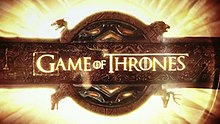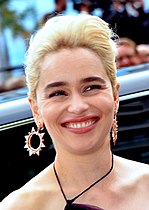Game of Thrones is an American fantasy drama television series created by David Benioff and D. B. Weiss for HBO. It is an adaptation of A Song of Ice and Fire, a series of fantasy novels by George R. R. Martin, the first of which is A Game of Thrones. The show premiered on HBO in the United States on April 17, 2011, and concluded on May 19, 2019, with 73 episodes broadcast over eight seasons.
Set on the fictional continents of Westeros and Essos, Game of Thrones has a large ensemble cast and follows several story arcs throughout the course of the show. The first major arc concerns the Iron Throne of the Seven Kingdoms of Westeros through a web of political conflicts among the noble families either vying to claim the throne or fighting for independence from whoever sits on it. The second focuses on the last descendant of the realm's deposed ruling dynasty, who has been exiled to Essos and is plotting to return and reclaim the throne. The third follows the Night's Watch, a military order defending the realm against threats from beyond Westeros' northern border.
Game of Thrones attracted a record viewership on HBO and has a broad, active, and international fan base. Critics have praised the series for its acting, complex characters, story, scope, and production values, although its frequent use of nudity and violence (including sexual violence) generated controversy. The final season received significant criticism for its reduced length and creative decisions, with many considering it a disappointing conclusion. The series received 59 Primetime Emmy Awards, the most by a drama series, including Outstanding Drama Series in 2015, 2016, 2018 and 2019. Its other awards and nominations include three Hugo Awards for Best Dramatic Presentation, a Peabody Award, and five nominations for the Golden Globe Award for Best Television Series – Drama.
A prequel series, House of the Dragon, premiered on HBO in 2022.
Premise
Plot
Game of Thrones is roughly based on the storylines of the A Song of Ice and Fire book series by George R. R. Martin, set in the fictional Seven Kingdoms of Westeros and the continent of Essos.[5][6] The series follows several simultaneous plot lines.[7] The first story arc follows a war of succession among competing claimants for control of the Iron Throne of the Seven Kingdoms, with other noble families fighting for independence from the throne. The second concerns the exiled scion's actions to reclaim the throne; the third chronicles the threat of the impending winter, as well as the legendary creatures and fierce peoples of the North.[8]
Cast and characters
Game of Thrones has an ensemble cast which has been estimated to be the largest on television.[9] In 2014, several actors' contracts were renegotiated to include a seventh-season option.[10] By the final season, five of the main cast members made $1 million per episode, making them among the highest paid television performers.
Eddard "Ned" Stark (Sean Bean) is the head of House Stark. He and his wife, Catelyn (Michelle Fairley), have five children: Robb (Richard Madden), Sansa (Sophie Turner), Arya (Maisie Williams), Bran (Isaac Hempstead-Wright), and Rickon (Art Parkinson). Ned also has an illegitimate son, Jon Snow (Kit Harington), who, along with his scholarly friend, Samwell Tarly (John Bradley), serve in the Night's Watch under Lord Commander Jeor Mormont (James Cosmo). The Wildlings living north of the Wall include Gilly (Hannah Murray) and the warriors Tormund Giantsbane (Kristofer Hivju) and Ygritte (Rose Leslie).[13]
Others associated with House Stark include Ned's ward Theon Greyjoy (Alfie Allen), Ned's vassal Roose Bolton (Michael McElhatton), and Roose's illegitimate son, Ramsay Snow (Iwan Rheon). Robb accepts help from the healer Talisa Maegyr (Oona Chaplin), while elsewhere, Arya befriends blacksmith's apprentice Gendry Rivers (Joe Dempsie) and assassin Jaqen H'ghar (Tom Wlaschiha). In the Stormlands, the tall warrior Brienne of Tarth (Gwendoline Christie) is introduced to Catelyn.
In King's Landing, Ned's friend, King Robert I Baratheon (Mark Addy), shares a loveless political marriage with Cersei Lannister (Lena Headey). Her younger twin brother, Ser Jaime (Nikolaj Coster-Waldau), serves on the Kingsguard while their younger brother Tyrion (Peter Dinklage) is attended by his mistress Shae (Sibel Kekilli) and mercenary Bronn (Jerome Flynn). Cersei's father is Tywin (Charles Dance), head of House Lannister and richest man in Westeros. Cersei has two sons: Joffrey (Jack Gleeson) and Tommen (Dean-Charles Chapman). Joffrey is guarded by the scar-faced warrior Sandor "The Hound" Clegane (Rory McCann).[14]
The king's Small Council includes his treasurer, Petyr "Littlefinger" Baelish (Aidan Gillen), and his spymaster, Varys (Conleth Hill). In Dragonstone, Robert's younger brother, Stannis (Stephen Dillane), is advised by foreign priestess Melisandre (Carice van Houten) and former smuggler Ser Davos Seaworth (Liam Cunningham). In the Reach, the Tyrell family is led by matriarch Olenna (Diana Rigg) and represented at court by her granddaughter Margaery (Natalie Dormer). The High Sparrow (Jonathan Pryce) is given power as a religious leader, while, in Dorne, the warrior Ellaria Sand (Indira Varma) seeks vengeance against the Lannisters.[13]
Across the Narrow Sea in Pentos, siblings Viserys Targaryen (Harry Lloyd) and Daenerys Targaryen (Emilia Clarke) (colloquially referred to as "Dany") are in exile, with the former plotting to reclaim his father's throne. Daenerys is forced into marrying Khal Drogo (Jason Momoa), a leader of the nomadic Dothraki. Her retinue eventually comes to include the exiled knight Ser Jorah Mormont (Iain Glen), her aide Missandei (Nathalie Emmanuel), mercenary Daario Naharis (Michiel Huisman), and elite soldier Grey Worm (Jacob Anderson).[13]
Themes
The series has been praised by both television critics and historians for what was perceived as a sort of medieval realism. George R. R. Martin set out to make the story feel more like historical fiction than contemporary fantasy, with less emphasis on magic and sorcery and more on battles, political intrigue, and the characters, believing that magic should be used moderately in the epic fantasy genre. Martin has said that, "the true horrors of human history derive not from orcs and Dark Lords, but from ourselves".[21] Academics have classified the series as neo-medieval which focuses on the overlapping of medieval history and popular fantasy. A common theme in the fantasy genre is the battle between good and evil, which Martin says does not mirror the real world.[25] Martin explores the relationship between good and evil through the questions of redemption and character change.[26] The series allows the audience to view different characters from their perspective, unlike in many other fantasies.
In early seasons, under the influence of the A Song of Ice and Fire books, main characters were regularly killed off, and this was credited with developing tension among viewers.[28] Martin stated in an interview that he wanted to depict war and violence in a realistic way, which sometimes mean the hero or main characters could be injured or killed.[29] In later seasons, critics pointed out that certain characters had developed "plot armor" to survive in unlikely circumstances and attributed this to Game of Thrones deviating from the novels to become more of a traditional television series.[28] In a 2012 study, out of 40 recent television drama shows, Game of Thrones ranked second in deaths per episode, averaging 14.[30] A scientific study conducted in 2018 stated that about 60% of the major characters died as a result of violence and war.[31]
Inspirations and derivations
Although the series's first season closely follows the events of the first novel, there were significant changes made for later seasons. According to Benioff, the TV adaptation is "about adapting the series as a whole and following the map George laid out for us and hitting the major milestones, but not necessarily each of the stops along the way".[32] Aspects of the novels' plots and their adaptations are based upon settings, characters, and events in European history.[33] Most of Westeros is reminiscent of high medieval Europe, from its geography and castles to its cultures, the feudal system, palace intrigues, and the knights' tournaments. Like medieval Europe, most of the houses in the series use the patriarchal system of power.[36] The series also includes elements of gothic fiction, including torture tropes.[37]
A principal inspiration for the novels is the English Wars of the Roses (1455–1485) between the houses of Lancaster and York, reflected in Martin's houses of Lannister and Stark.[38] The scheming Cersei Lannister evokes Isabella, the "She-Wolf of France" (1295–1358).[33] She and her family, as portrayed in Maurice Druon's historical novel series, The Accursed Kings, were a main inspiration of Martin's.[39] Other historical antecedents of series elements include: Hadrian's Wall (which becomes Martin's Wall), the Roman Empire, and the legend of Atlantis (ancient Valyria), Byzantine Greek fire ("wildfire"), Icelandic sagas of the Viking Age (the Ironborn), the Mongol hordes (the Dothraki), the Hundred Years' War, and the Italian Renaissance.[33] The series's popularity has been attributed, in part, to Martin's skill at fusing these elements into a seamless, credible version of alternate history



.png)
.png)
.png)
.png)
.png)
.png)
.png)













